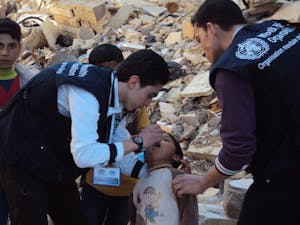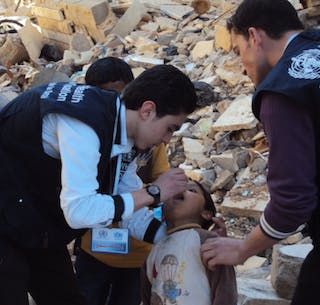I recently had the opportunity to speak with Elizabeth Hoff, the World Health Organization (WHO) representative in Syria. WHO leads the health sector response to issues arising from the conflict, which entered its fourth year this month. Though she is no stranger to conflict situations, having previously worked in Somalia and Afghanistan, Hoff says her work in Syria has come with unprecedented challenges.
Chelsea Hedquist: What are the most pressing health challenges facing the people of Syria?
 Elizabeth Hoff: The biggest challenge is the inability of health workers to actually access patients in order to provide them with the treatment they need. There are more than 200,000 people in Syria that we consider inaccessible. These are diabetics who need insulin, wounded patients who need blood transfusions, expectant mothers, etc. But the level of fighting makes it extremely difficult to reach them with medicines and services.
Elizabeth Hoff: The biggest challenge is the inability of health workers to actually access patients in order to provide them with the treatment they need. There are more than 200,000 people in Syria that we consider inaccessible. These are diabetics who need insulin, wounded patients who need blood transfusions, expectant mothers, etc. But the level of fighting makes it extremely difficult to reach them with medicines and services.
Moreover, health facilities and health workers have become direct targets of armed groups during the conflict. In Syria, 73% of public hospitals have been damaged and 45% are completely out-of-service. Just recently, a maternity wing in Damascus was hit by a mortar. A woman preparing to have a c-section literally had to get up from the operating table and run. I have never before seen the direct targeting of hospitals and health workers on this scale. It’s very disturbing.
CH: What role does WHO play in Syria and what you have achieved thus far?
EH: WHO provides technical advice to local and central health authorities and coordinates the health sector response. While we can’t take over the role the government once played in the health system, we can do our best to fill critical gaps. For example, we developed a priority list of medicines and delivered medication to 4.6 million people in 2013 and 2.4 million since the start of 2014. We have set up an early warning alert and response system to replace what was previously a very well-functioning surveillance system. This includes 461 sites, which report weekly on 10 diseases.
WHO also plays a crucial role in delivering vaccines. Since polio cases were reported last fall, we have conducted monthly campaigns and have, together with UNICEF, supported the health authorities in vaccinating over 2.9 million children under the age of 5 against polio across Syria. This includes setting up procurement of vaccines and independent monitoring, coordinating vaccine delivery, ensuring accurate reporting, raising awareness among communities, and more. While we’re proud to have reached millions of children, at this point it’s more important to go beyond those numbers and identify those who haven’t been reached. We also need to go beyond polio to focus on measles, as we’ve begun to see outbreaks in the northeastern areas. In fact, we need to go beyond measles and step up routine immunization as a whole. The immunization coverage here used to be over 90%, now it is lower than 60%.
CH: Which organizations/agencies does WHO work with to address these challenges and how important is partnership and collaboration?
EH: Partnership is crucial. We work with a range of UN agencies, as well as organizations such as the International Committee of the Red Cross and the Syrian Arab Red Crescent. But our most important means of reaching people in opposition-held areas is through our work with 60 local NGOs. Our community-level partnership is truly critical.
CH: What is the biggest barrier to addressing and resolving health challenges in Syria?
EH: The war, itself, is the biggest barrier. I have sent out members of my team to deliver supplies and they’ve had to turn back for fear of losing their lives.
We also face the challenge of insufficient resources. We have asked for $178 million to pay for our emergency response, but thus far we have only received $32 million. While we are grateful to our current donors, the symptoms of a health system that is breaking down are only becoming more severe as we move into the fourth year of the conflict. This means we will need more resources, not fewer, to respond.
CH: What would you ask individuals/organizations to do to support your efforts?
EH: The most important thing is to increase advocacy to find a political solution to the conflict and to advocate for the protection of patients, health workers, and facilities. Obviously we’re going to keep pleading for funding because we can’t do our job without adequate resources.
The national staff here in Syria is outstanding – they are really some of WHO’s best. But what we are able to do is still a drop in the ocean. So much credit should go to the Syrian people, themselves. I’ve been incredibly touched by the way Syrians and neighboring countries have responded to the crisis and by their generosity toward each other.

